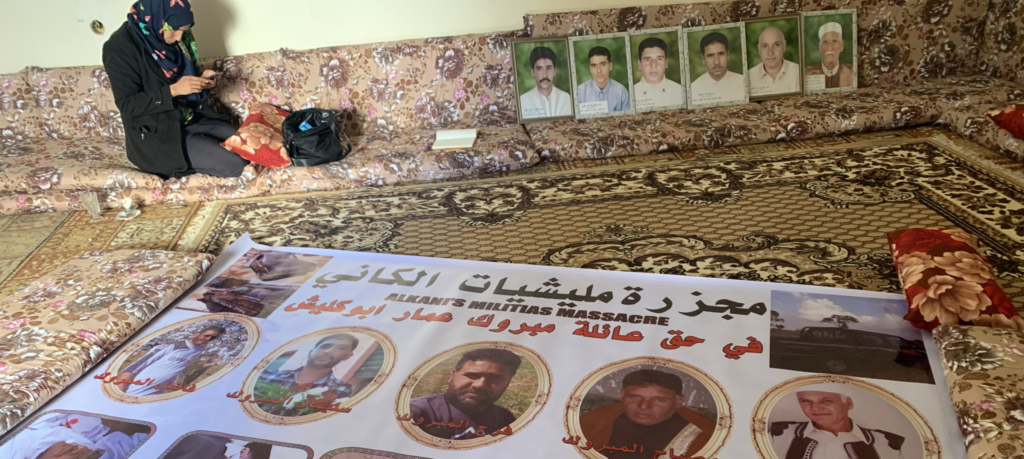
Over four years after al-Kaniat armed group was ousted from the Libyan city of Tarhouna leaving mass graves in its wake, justice and adequate reparations remain elusive for survivors and relatives of victims of its merciless reign of terror involving mass unlawful killings, torture and enforced disappearances, Amnesty International said in a new report published today.
“Every day we die a thousand times”: Impunity for crimes against humanity in Tarhouna, Libya finds there to be reasonable grounds to believe that al-Kaniat committed the crimes against humanity of murder, torture, enforced disappearance and unlawful imprisonment, as part of their planned, systematic and large-scale attack against the civilian population of Tarhouna between 2015 and 2020, in the aim of maintaining their control over the area.
In an important step towards justice, in October 2024, the International Criminal Court (ICC) announced arrest warrants against six people for their alleged responsibility in war crimes in Tarhouna, but they remain at large and/or yet to be surrendered to the court.
“Four years after the ousting of al-Kaniat from Tarhouna, people are still reeling from the armed group’s campaign of terror. Survivors know such crimes could not have been committed without the complicity of successive governments, de facto authorities, powerful militias and armed groups in Libya,” said Diana Eltahawy, Amnesty International’s Deputy Regional Director for the Middle East and North Africa.
“The Libyan government and Libyan Arab Armed Forces (LAAF) must publicly apologize to survivors and victims’ relatives and ensure that all receive full reparations, including financial compensation, without discrimination, and cooperate in the arrest and handover of suspects to the ICC. Members of the international community should press the Libyan authorities to stop integrating members of armed groups or militias into state institutions without individualized vetting to exclude those reasonably suspected of crimes under international law, pending criminal investigations, and ensure that horrific crimes like those committed in Tarhouna will not be repeated.”
Survivors know such crimes could not have been committed without the complicity of successive governments, de facto authorities, powerful militias and armed groups in Libya.
Diana Eltahawy, Amnesty International
Al-Kaniat’s crimes were enabled, first by the then internationally recognized Government of National Accord (GNA), and subsequently by its rival, the self-proclaimed LAAF, both of which provided them support, legitimacy and funding.
Between February 2022 and October 2024, Amnesty International interviewed 74 individuals, including former detainees, victims’ relatives and forensic experts. Based on their testimonies and other evidence collected during visits to Tarhouna and Tripoli, the organization documented the cases of 159 individuals from 23 extended families, who were abducted by al-Kaniat between 2012 and 2020, and later unlawfully killed or remain forcibly disappeared.
Families torn apart through murder, enforced disappearances and forced displacement
Al-Kaniat maintained their brutal stranglehold over Tarhouna by eliminating any actual or potential rivals and critics, and targeting their entire extended families.
Al-Kaniat would abduct and unlawfully kill all the men in a family. Then, at gunpoint, order the rest of their extended families to leave Tarhouna, an abusive practice amounting to forced displacement. Al-Kaniat would then seize all their property and assets. The majority of abductions were carried out between April 2019 and June 2020 when al-Kaniat were operating under the LAAF.
According to the General Authority for Search and Identification of Missing Persons(GASIMP) most of the 343 bodies recovered and examined after al-Kaniat’s defeat bore gunshot wounds, mainly to the head or upper body, and most had their hands tied behind their back and/or were hooded or blindfolded.
The evidence available to Amnesty International also suggests that, in addition to crimes against humanity, many of the acts perpetrated by al-Kaniat, including murder, seizure of property without military necessity and forced displacement, also violate international humanitarian law and constitute war crimes.
The fate and whereabouts of at least 68 people seized by al-Kaniat remain unknown to date, according to the Tarhouna Victims Association (TVA).
The suffering of families of victims has been compounded by the failure of the Libya authorities to grant them adequate reparation. Only 37 families received financial support from a state body mandated to support “martyrs”.
Other families told Amnesty International that their efforts to secure compensation were met with bureaucratic obstacles, delays or refusals.
Women and children not spared
Most of those abducted and unlawfully killed were civilians, including at least four women and three children.
Al-Kaniat abducted Abdelali al-Fellus and his four sons from their home on 3 April 2020, unlawfully killing him and three of the boys – Mohammed, 10; Abdelmalik, 14; and Abdelrahman, 15.
Their mother, Ghazal Miftah, learned of the killings from her surviving child, then eight-year-old Mouadh: “They [al-Kaniat] put them against the fence and shot them dead, all four of them, and little Mouadh was forced to watch… He remains traumatized to this day.”
On 5 April 2020, al-Kaniat abducted three sisters from the Harouda family: Hawa (known as Rahma), 46; Leila (known as Salma), 45; and Reem, 37, a mother of four who was pregnant at the time. Their relatives believe they were targeted due to their brother’s involvement with anti-Kaniat militias.
The sisters’ bodies were found together on 22 January 2021 in a mass grave. The family did not receive any financial compensation, despite winning a court case ordering the Tripoli-based government to pay the family LYD 1.5 million (USD 310,623).
Torture
Al-Kaniat subjected those they abducted to torture and other inhumane acts, including beatings with water pipes, whips and rifle butts; sexual violence; and electric shocks.
In February 2022, Amnesty International visited “Boxat”, an agricultural compound that was used as a makeshift detention facility. Detainees were forcibly placed inside small, box-like structures without access to toilets and enough food. Al-Kaniat fighters lit fires on top of the structures, exposing detainees to extreme heat and suffocation from fumes.
“Malek”, who was detained at the Judicial Police prison in Tahouna, said that al-Kaniat fighters used a torture method known as “balanco” which involved hanging him by the wrists before violently dropping him to the ground: “They started giving me electric shocks, to my body, to my genitals… I told them everything they wanted to hear.”
Justice
Since the capture of Tarhouna by GNA forces in June 2020, the Tripoli-based prosecution announced investigations and the issuing of 400 arrest warrants. However these investigations did not examine the role, complicity and command responsibility of officials and militia leaders who remain in power.
At least 29 individuals, only five of whom are detained, have been convicted and sentenced to death or prison terms following unfair trials by civilian and military courts in western Libya for a range of crimes related to al-Kaniat’s reign.
The notorious Deterrence Apparatus for Combating Terrorism and Organized Crime militia, which has a well-documented record of involvement in torture and other serious violations, has been involved in evidence collection and the detention of suspects, including of Abdelbari Al Shaqaqi, wanted by the ICC, which risks perverting the course of justice.


